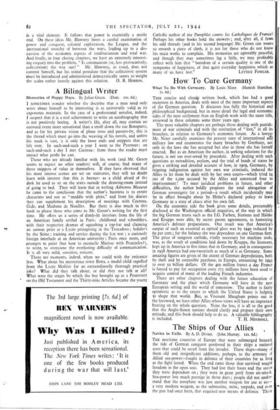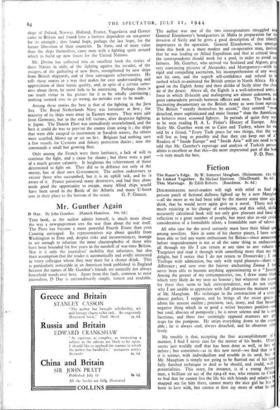The Ships of Our Allies
Navies in Exile. By A. D. Divine. (John Murray. ns. 6d.) THE maritime countries of Europe that were submerged beneath the tide of German conquest possessed in their ships a national asset that could be saved from the invader. These ships—many of them old and insignificant additions, perhaps, to the armoury of Allied sea-power—fought in defence of their countries for as long as the fight lasted. When the end came those that survived sought freedom in the open seas. They had lost their bases and the stores they were dependent on ; they were in great peril from air-attack. Sea-power lost much prestige in those days ; people did not under- stand that the aeroplane was just another weapon for use at sea— a very modern weapon, as the submarine, mine, torpedo, and even the gun had once been, that required new means of defence. These
ships of Poland, Norway, Holland, France, Yugoslavia and Greece came to Britain and found here a fortress dependent on sea-power for its strength ; they found hope, perhaps the last hope, for the future liberation of their countries. In them, and of more value than the ships themselves, came men with a fighting spirit around which to build up new forces for the United Nations.
Mr. Divine has collected into an excellent book the stories of these Navies in exile, of the fighting against the invader, of the escapes, of the gathering of new fleets, strengthened by new ships from British shipyards, and of their suosequent achievements. He tells these stories in a way that makes for easy understanding and appreciation of their heroic quality, and, in spite of a certain same- ness about them, he never fails to be interesting. Perhaps there is too much virtue in his picture for it to be wholly convincing ; nothing seemed ever to go wrong, no mistake ever to be made.
Among these stories the best is that of the fighting in the Java Sea. The Royal Netherlands Navy was fortunate at first ; the majority of its ships were away in Eastern waters. They were safe from Germany, but in the end fell victims, after desperate fighting, tt. Japan. The Danish Fleet was immediately overwhelmed, and the best it could do was to prevent the enemy from using it ; the ships that were able escaped to internment in Swedish waters, the others were scuttled, blown up or set on fire. Belgium had nothing save a few vessels for Customs and fishery protection duties ; now she commands a small but growing fleet.
Only among the French were there hesitancy, a lack of will to continue the fight, and a cause for shame ; but these were a part of a much greater calamity. It heightens the Achievement of those determined to fight on. They did so in defiance not only of the enemy, but of their own Government. The author endeavours to excuse those who succumbed, but it is an uphill task, and he is aware of it. France possessed many destroyers, and had they alone made good the opportunity to escape, many Allied ships would have been saved in the Battle of the Atlantic and many U-boats
sent in their place to the bottom of the ocean. G. P. GIUGGS.























 Previous page
Previous page